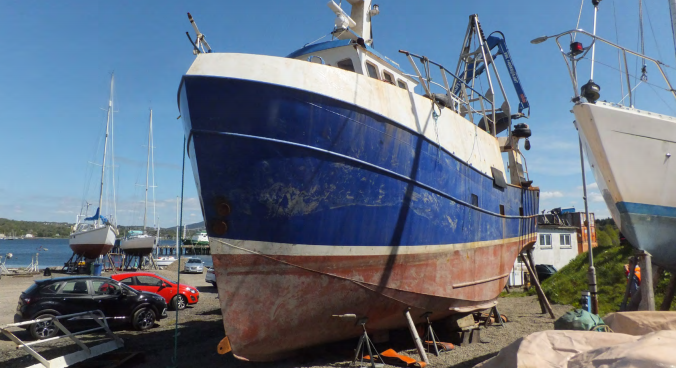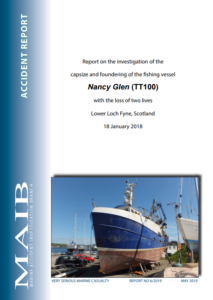The UK MAIB issued an investigation report on the capsize and sinking of the prawn trawler ‘Nancy Glen’ off Scotland in January 2018, which resulted in two fatalities. With respect to this incident, MAIB highlighted the necessity of fishing vessels to have sufficient stability to meet their operating profile.
The incident
At about 1750 on 18 January 2018, the prawn trawler ‘Nancy Glen’ capsized and later sank in Lower Loch Fyne, Scotland. Weather conditions were benign, and rescuers were quickly at the scene; however, only one of the three crew survived.
Nancy Glen was trawling at the time of the accident and the combined effect of a turn to starboard at the same time as the starboard net filling with mud caused the vessel to rapidly heel to starboard, then capsize. Through life modifications to the vessel had reduced its stability, increasing its vulnerability to capsize.
Realizing the seriousness of the situation, one crewman dashed to escape. However, the darkness, disorientation, rapid nature of the capsize event and inrush of water to the wheelhouse will have denied the other two crew members the opportunity to escape.
Probable causes
Nancy Glen’s stability was insufficient to overcome the combined effect of increased loading of the starboard trawl warp and the vessel’s simultaneous turn to starboard.
Conclusions
- The cumulative effect of the various modifications to Nancy Glen carried out since 2002, culminating in the replacement of the crane during the 2017/18 Christmas layover, was to reduce the vessel’s stability, and significantly increase its vulnerability to capsize.
- Nancy Glen’s owners had made their own stability assessment and, in some cases, had taken professional advice on the effect of through life vessel modifications before they were implemented. However, there was no requirement for the skipper or crew of under 16.5m registered length fishing vessels to undertake stability awareness training, which limited their ability to conduct effective stability assessments.
- Regardless of any requirement or recommendation to seek professional advice and/or approval for any proposed vessel modification, unless a vessel’s stability is known, there will be uncertainty as to the extent to which that modification may increase the potential for the vessel to capsize.
- The evidence from multiple investigations into the capsize and foundering of small fishing vessels, coupled with the negligible adoption of the Wolfson Mark, clearly indicates that, despite available guidance most owners and skippers of small vessels are unaware of the risks of not conducting stability assessments. The case for introducing stability criteria for small fishing vessels has been made by the MAIB and has been accepted by the MCA. However, until such criteria have been derived and implemented, it is likely that more vessels will be lost.
- The 2017 Code of Practice only required owners of UK fishing vessels to notify the MCA of substantial modifications; however, this was inconsistent with SI 943 that obligated owners to notify the MCA of any proposals to alter or modify a vessel. This inconsistency introduced an environment where owners could exercise judgement on what constituted a substantial modification, rather than meeting the requirement of SI 943.
- The heeling moment developed rapidly to a point at which the vessel’s righting lever vanished before the skipper’s restorative action could take effect.
- The rapid capsize and inversion of Nancy Glen would have resulted in significant displacement of any loose gear which, coupled with the men’s inevitable disorientation exacerbated by darkness, is likely to have impeded their attempts to exit the vessel.
- In addition to the vessel’s increased inherent top weight, as the week’s fishing progressed the amount of fuel, stored low in the vessel, would have decreased, thereby raising the vessel’s VCG and negatively impacting on its inherent stability
Lessons learned
- It is critical that fishing vessels have sufficient stability to meet their operating profile. Nancy Glen’s stability was insufficient to overcome the circumstances of a net digging into the seabed concurrently with the vessel turning.
- Recent modifications to Nancy Glen had a detrimental effect on the vessel’s stability but no checks had been carried out to assess the effect on stability.
- Although voluntary guidance was available, there was no mandatory requirement for owners of small fishing vessels to carry out stability assessments.
Recommendations
MAIB issued a safety recommendation to the Maritime and Coastguard Agency (MCA) to ensure that the stability of all fishing vessels under 15m is assessed and regularly reviewed.
Explore more herebelow:





























































